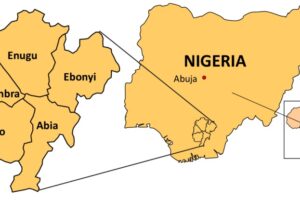
Christian C. Madubuko, PhD
Nigerian missions overseas are critical to the country’s diplomatic and economic interests. However, supporting these missions can be a significant challenge, especially in terms of funding and resources. One effective way to overcome these challenges is by partnering with foreign companies. This report highlights the importance of partnerships in supporting Nigerian missions and provides practical strategies for collaboration.
Benefits of Partnerships for Nigerian Missions:
Partnership is a cornerstone for supporting Nigerian missions abroad and raising revenue for the mission. Partnership and collaboration are one of the major functions Ambassadors play. Below are some of the benefits of partnership for supporting foreign missions abroad:
Financial Support: Partnerships can provide financial support to Nigerian missions, enabling them to achieve their goals and objectives.
Resources and Expertise: Foreign companies can share their resources and expertise, enhancing the capacity of Nigerian missions to deliver effective services.
Networking Opportunities: Partnerships can create opportunities for networking and collaboration between Nigerian missions and foreign companies, leading to new partnerships and business opportunities.
Capacity Building: Partnerships can help build the capacity of Nigerian missions, enabling them to respond more effectively to emerging challenges and opportunities.
Improved Visibility: Partnerships can increase the visibility of Nigerian missions, enhancing their reputation and credibility in the global community.
Increased Visibility: Partnerships can increase the visibility of Nigerian missions, enhancing their reputation and credibility in the global community.
Access to New Markets: Partnerships can provide access to new markets, customers, and business opportunities.
Improved Services: Partnerships can lead to improved services for Nigerian citizens, such as better consular services, trade facilitation, and economic development.
Enhanced Diplomatic Relations: Partnerships can strengthen diplomatic relations between Nigeria and foreign countries, leading to improved bilateral cooperation.
Knowledge Sharing: Partnerships can facilitate knowledge sharing between Nigerian missions and foreign companies, promoting innovation and capacity building.
Strategies for Collaboration:
Identify Shared Interests: Identify shared interests and goals between Nigerian missions and foreign companies and develop partnerships that align with these interests.
Develop a Partnership Strategy: Develop a partnership strategy that outlines the goals, objectives, and scope of the partnership.
Build Relationships: Build relationships with key stakeholders, including government officials, business leaders, and community leaders.
Foster Communication: Foster open communication and collaboration between Nigerian missions and foreign companies.
Monitor Progress: Monitor progress regularly and evaluate the effectiveness of the partnership.
Examples of Successful Partnerships:
Nigeria-UK Partnership: The Nigerian High Commission in London partnered with the UK-based company, British Council, to promote cultural exchange and education between Nigeria and the UK. Similarly, the Nigeria-UK Partnership for Renewable Energy was also executed by the Nigerian High Commission in London which partnered with the UK-based company, Siemens, to develop a renewable energy project in Nigeria.
Nigeria-USA Partnership for Agricultural
Development: The Nigerian Embassy in Washington DC partnered with the US-based company, General Electric, to develop a technology-based solution for agricultural development in Nigeria.
Nigeria-Germany Partnership: The Nigerian Embassy in Berlin partnered with the German company, Siemens, to promote trade and investment between Nigeria and Germany.
Nigeria-China Partnership for Infrastructure.
Development: The Nigerian Ministry of Foreign Affairs partnered with the Chinese government to develop infrastructure development project in Nigeria.
Best Practices for Effective Partnerships
Clear Communication: Maintain clear communication throughout the partnership process and clearly define the objectives and scope of the partnership to ensure mutual understanding and agreement. Clear communication channels will ensure regular and open communication between partners.
Clearly Define Objectives: Clearly define the objectives and scope of the partnership to ensure mutual understanding and agreement.
Develop a Joint Action Plan: Develop a joint action plan to outline the steps needed to achieve the partnership’s objectives.
Monitor Progress: Regularly monitor progress and evaluate the effectiveness of the partnership.
Foster Flexibility: Foster flexibility and adaptability in the partnership to respond to changing circumstances and challenges.
Mutual Benefits: Ensure that both parties benefit from the partnership.
Transparency: Ensure transparency in all aspects of the partnership.
Foster Flexibility: Foster flexibility and adaptability in the partnership to respond to changing circumstances and challenges.
Evaluation: Regularly evaluate the effectiveness of the partnership.
Challenges:
Cultural Differences: Cultural differences can pose challenges in partnerships between Nigerian missions and foreign companies.
Language Barriers: Language barriers can create communication challenges in partnerships.
Trust Issues: Trust issues can arise when partnering with foreign companies or governments, particularly if there are concerns about data security or intellectual property.
Regulatory Challenges: Regulatory challenges can arise when partnering with foreign companies or governments, particularly if there are different laws and regulations governing the partnership.
Conclusion:
Partnerships between Nigerian missions and foreign companies can be a powerful tool for supporting Nigerian missions overseas. By identifying shared interests, developing a partnership strategy, building relationships, fostering communication, and monitoring progress, Nigerian missions can build strong partnerships that benefit both parties. Best practices such as clear communication, mutual benefits, transparency, flexibility, and evaluation can help overcome challenges and ensure successful partnerships.
Recommendations:
Develop a Partnership Strategy: Develop a comprehensive partnership strategy that outlines goals, objectives, and scope of partnerships.
Build Relationships: Build relationships with key stakeholders, including government officials, business leaders, and community leaders.
Foster Communication: Foster open communication and collaboration between Nigerian missions and foreign companies.
Monitor Progress: Monitor progress regularly and evaluate the effectiveness of partnerships.
Develop Capacity Building Programs: Develop capacity building programs that enhance the capacity of Nigerian missions to respond effectively to emerging challenges and opportunities.
By implementing these recommendations, Nigerian missions can build strong partnerships with foreign companies that support their goals and objectives while promoting mutual benefits and cooperation.
Dr. Christian C. Madubuko – a Political & Diplomatic Historian, is a Senior Lecturer at the Department of History & International Studies, Nnamdi Azikiwe University, Awka, Nigeria, & a researcher at LaTrobe University, Melbourne, Australia. Madubuko was a former Anambra Commissioner for Diaspora Affairs, Culture and Tourism as well as the Executive Director of Operations, Anambra Internal Revenue Service. He writes from Canberra – The Australian Capital Territory, ACT.




